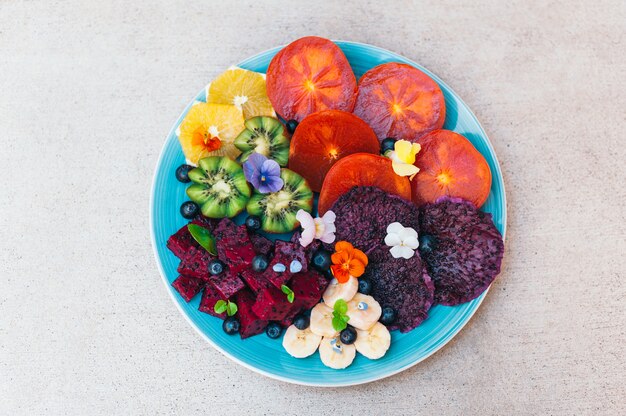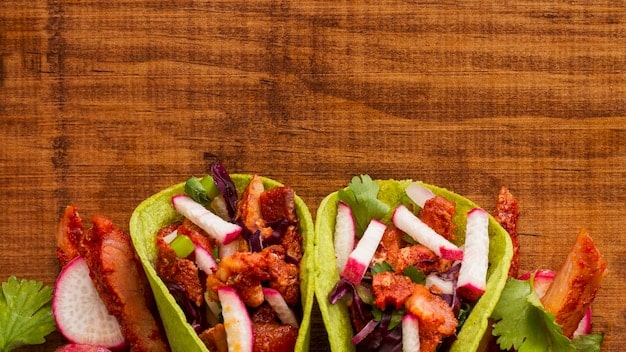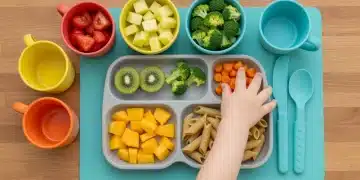Plant-Based Meals for Kids: Delicious and Nutritious Recipes

Plant-based meals for kids offer a nutritious and delicious way to introduce children to healthier eating habits, promoting both their well-being and environmental sustainability through a variety of creative and balanced recipes.
Are you looking for ways to incorporate more plant-based foods into your child’s diet? Discover delicious and nutritious plant-based meals for kids that are both easy to prepare and appealing to even the pickiest eaters.
Introduction to Plant-Based Eating for Children
Plant-based eating is gaining popularity, and for good reason. It’s a way of eating that focuses on foods derived from plants, including fruits, vegetables, legumes, nuts, seeds, and whole grains. When it comes to children, a well-planned plant-based diet can provide all the nutrients they need for healthy growth and development.
Making the switch to more plant-based meals doesn’t have to be a daunting task. With the right recipes and a little creativity, you can create meals that are both nutritious and delicious, appealing to even the most discerning young palates.
Benefits of Plant-Based Diets for Kids
Introducing plant-based diets to children can offer numerous health advantages that contribute to their overall well-being. These diets, rich in fruits, vegetables, legumes, and whole grains, provide essential nutrients and promote healthy habits from a young age.
Improved Nutrient Intake
Plant-based diets for kids are packed with vitamins, minerals, and antioxidants. These diets naturally encourage the consumption of diverse fruits and vegetables, ensuring children receive a wide array of nutrients vital for growth and development.
Reduced Risk of Chronic Diseases
Early adoption of plant-based eating habits can lower the risk of developing chronic diseases later in life. These diets are typically lower in saturated fats and cholesterol, which can help prevent heart disease, obesity, and type 2 diabetes.
- 🍎 Enhanced Fiber Intake: Plant-based diets are high in fiber, promoting healthy digestion and preventing constipation.
- 🥦 Weight Management: Plant-based foods are often lower in calories and higher in volume, aiding in weight management.
- 🌱 Allergy-Friendly Options: Plant-based diets can be customized to avoid common allergens like dairy, eggs, and nuts, making them suitable for children with allergies.

By offering plant-based options, parents can instill a lifelong appreciation for healthy eating. Preparing meals together can also become a fun, educational experience. Ultimately, integrating plant-based meals into a child’s diet is a positive step toward promoting their health and well-being.
Essential Nutrients for Plant-Based Kids
Ensuring your child gets all the necessary nutrients is crucial when following a plant-based diet. While plant-based meals can be incredibly nutritious, understanding how to source key nutrients is essential for healthy development.
Here are some essential nutrients to focus on:
Protein
Protein is vital for growth and repair. Good plant-based sources include lentils, chickpeas, beans, tofu, tempeh, and quinoa. Combining different sources throughout the day ensures a complete amino acid profile.
Iron
Iron is necessary for oxygen transport and energy production. Plant-based sources include spinach, kale, lentils, and fortified cereals. Pairing these foods with a source of vitamin C, like oranges or bell peppers, enhances iron absorption.
Calcium
Calcium is essential for strong bones and teeth. Plant-based sources include fortified plant milks, tofu, kale, broccoli, and almonds. Choose calcium-set tofu for an extra boost.
Vitamin B12
Vitamin B12 is critical for nerve function and red blood cell formation. It’s not naturally found in plant foods, so supplementation or fortified foods like plant milks and nutritional yeast are necessary.
- ☀️ Vitamin D: Vitamin D aids in calcium absorption and bone health. Fortified plant milks and exposure to sunlight are good sources, but supplementation may be needed, especially in regions with limited sunlight.
- 🐟 Omega-3 Fatty Acids: Omega-3s are important for brain health. Sources include flaxseeds, chia seeds, walnuts, and algae-based supplements.
Careful planning and attention to these key nutrients can ensure that children on plant-based diets receive all the necessary building blocks for healthy growth and development. Consulting with a pediatrician or registered dietitian can further tailor the diet to meet individual needs.
Delicious Plant-Based Recipes Kids Will Love
One of the keys to successfully incorporating plant-based meals into your child’s diet is to make them appealing and delicious. Here are some kid-friendly recipes that are both nutritious and easy to prepare.
Veggie Nuggets
These homemade veggie nuggets are a healthier alternative to store-bought versions. Combine mashed sweet potatoes, broccoli florets, and cooked quinoa. Season with garlic powder and a pinch of salt, then form into nugget shapes and bake until golden brown.
Lentil Soup
Lentil soup is a hearty and nutritious meal that’s packed with protein and fiber. Sauté diced carrots, celery, and onions, then add lentils, vegetable broth, and your favorite herbs. Simmer until the lentils are tender and serve with a side of whole-grain bread.
Sweet Potato and Black Bean Tacos
These tacos are a fun and flavorful way to get kids excited about plant-based eating. Roast diced sweet potatoes with chili powder and cumin. Fill taco shells with the roasted sweet potatoes, black beans, shredded lettuce, and a dollop of avocado cream.

- 🌱 Plant-Based Pizza: Use whole-wheat crust, tomato sauce, and a variety of veggies like bell peppers, mushrooms, and spinach. Top with a sprinkle of vegan cheese for a cheesy flavor.
- 🍎 Fruit and Veggie Smoothies: Blend fruits like berries, bananas, and mangoes with spinach or kale, plant-based milk, and a scoop of protein powder for a quick and nutritious breakfast or snack.
By introducing a variety of colors, flavors, and textures, you can make plant-based meals a hit with your kids. Don’t be afraid to experiment with different recipes and ingredients to find what they enjoy the most.
Tips for Transitioning to Plant-Based Meals
Transitioning your kids to plant-based meals can be a smooth and enjoyable process with the right approach. Gradual changes and positive reinforcement can make a big difference in their acceptance and enjoyment of new foods.
Here are some helpful strategies:
Start Slowly
Instead of making a sudden switch, gradually introduce plant-based meals into your child’s diet. Begin by swapping out one or two meals a week with plant-based options, such as meatless Mondays or taco Tuesdays with lentil filling.
Involve Your Kids
Get your kids involved in the meal planning and preparation process. Let them choose recipes, shop for ingredients, and help with cooking. This can increase their interest and willingness to try new foods.
Make it Fun
Present plant-based meals in a fun and appealing way. Use cookie cutters to create fun shapes with fruits and vegetables, arrange food into creative patterns on their plates, or serve meals with colorful utensils and plates.
- 🌱 Offer Variety: Provide a wide range of plant-based foods to ensure your child gets all the nutrients they need. Include different colors, textures, and flavors to keep meals interesting and exciting.
- 🍎 Be a Role Model: Let your kids see you enjoying plant-based meals. When they see you eating and enjoying these foods, they’re more likely to try them as well.
Remember, patience and persistence are key. It may take time for your child to adjust to new flavors and textures, but with a positive and supportive approach, you can successfully incorporate more plant-based meals into their diet.
Addressing Common Concerns About Plant-Based Diets for Kids
Some parents may have concerns about the safety and adequacy of plant-based diets for children. It’s important to address these concerns with accurate information and evidence-based advice.
Here are some common concerns and how to address them:
Is a Plant-Based Diet Safe for Kids?
Yes, a well-planned plant-based diet can be perfectly safe and nutritious for children of all ages. It’s essential to ensure they are getting all the necessary nutrients, such as protein, iron, calcium, vitamin B12, and vitamin D. Consulting with a healthcare professional or registered dietitian can help ensure their nutritional needs are met.
Will My Child Get Enough Protein?
It’s a common misconception that plant-based diets lack protein. In reality, there are many excellent plant-based sources of protein, including lentils, chickpeas, beans, tofu, tempeh, and quinoa. Combining these sources throughout the day will provide a complete protein profile.
How Can I Ensure My Child Gets Enough Iron?
Iron is crucial for energy and growth. Serve iron-rich plant foods like spinach, kale, lentils, and fortified cereals. Pair these foods with a source of vitamin C, such as oranges or bell peppers, to enhance iron absorption.
- 🌱 What About Calcium?: Calcium is essential for strong bones and teeth. Provide calcium-rich foods like fortified plant milks, tofu, kale, broccoli, and almonds. Choose calcium-set tofu for an added boost.
- 🍎 Vitamin B12 Concerns: Vitamin B12 is not naturally found in plant foods. Supplementation or fortified foods like plant milks and nutritional yeast are necessary to ensure your child gets enough.
By addressing these concerns with accurate information and careful planning, you can confidently provide your child with a healthy and balanced plant-based diet that supports their growth and well-being.
| Key Point | Brief Description |
|---|---|
| 🍎 Nutrient-Rich Foods | Focus on fruits, vegetables, legumes, and whole grains for essential vitamins and minerals. |
| 🌱 Protein Sources | Include lentils, chickpeas, beans, tofu, and quinoa for adequate protein intake. |
| 🥦 Transition Tips | Start slowly, involve kids, and make meals fun to encourage acceptance. |
| ☀️ Addressing Concerns | Ensure adequate iron, calcium, and B12 through fortified foods or supplements. |
Frequently Asked Questions
Yes, plant-based diets can be appropriate for all stages of life, including infancy, childhood, and adolescence. The key is to ensure the diet is well-planned and meets all nutritional requirements for each age group.
To appeal to picky eaters, get creative with presentation. Use fun shapes, colorful plates, and interesting textures. Involve kids in meal planning and preparation, and offer choices to empower them in their food decisions.
Excellent plant-based protein sources include lentils, chickpeas, beans, tofu, tempeh, quinoa, nuts, and seeds. Combine these throughout the day to ensure a complete amino acid profile, supporting healthy growth.
Supplementation may be necessary to ensure adequate intake of certain nutrients, particularly vitamin B12 and vitamin D. Consult with a healthcare provider to determine the specific needs of your child.
Regularly monitor your child’s health and consult with a pediatrician or registered dietitian. Ensure they consume a variety of nutrient-dense plant foods and consider fortified options or supplements to address any deficiencies promptly.
Conclusion
Incorporating plant-based meals for kids is a wonderful way to promote health, sustainability, and a lifelong appreciation for wholesome foods. By understanding essential nutrients, trying out delicious recipes, and addressing common concerns, you can confidently nourish your children with the power of plants.





